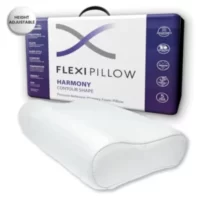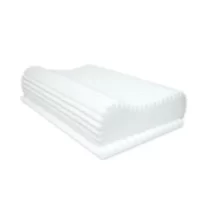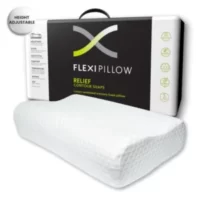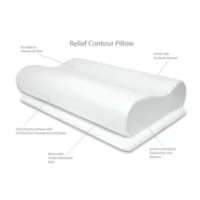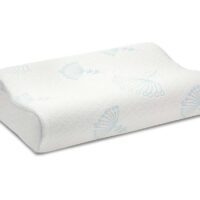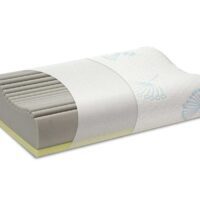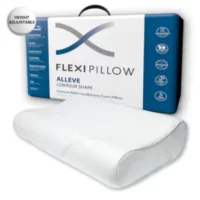Article by John Miller
How to Choose the Perfect Pillow for Your Neck


Why is the Right Pillow Important?
Choosing the right pillow is crucial for maintaining proper neck and spine alignment during sleep. A well-suited pillow can alleviate discomfort, promote better sleep quality, and even improve overall health. This FAQ page guides you through the process of finding your ideal pillow, answering common questions, and linking to helpful resources.
Selecting the correct pillow helps maintain a neutral spine position, which is vital for reducing neck strain and ensuring restful sleep. An unsuitable pillow can lead to poor sleep posture, resulting in aches, pains, and even long-term health issues.
Related Articles:
- Neck Pain – Discusses common causes of neck pain and how proper support can prevent it.
- Good Posture – Explains the role of posture in overall health and how pillows can support good posture.
- Pillow Selection Guide – Offers in-depth advice on choosing the right pillow for your specific needs.
How Do You Choose the Best Pillow?
Choosing the right pillow depends on several factors, including your sleeping position, pillow material, and personal comfort preferences. It's important to understand the different types of pillows available and how they can cater to your unique requirements.
- Memory foam pillows conform to your body's shape, offering personalised support and relieving pressure points.
- Down pillows provide a soft, luxurious feel with a lightweight and fluffy texture.
- Latex pillows, known for their durability, offer firm yet responsive support, making them ideal for those needing extra neck stability.
- Body pillows are long and cylindrical, providing full-body support, particularly beneficial during pregnancy or for side sleepers.
- Wedge pillows, shaped like a triangle, are designed to elevate specific body parts, helping to alleviate conditions like acid reflux or snoring.
- Cooling pillows are made with materials that regulate temperature, ensuring a cool, comfortable sleep, especially for hot sleepers.
- Lastly, buckwheat pillows, filled with buckwheat hulls, are firm and adjustable, moulding to your shape while providing excellent airflow and support.
What Should You Consider When Buying a Pillow?
When purchasing a pillow, consider your preferred sleeping position, the filling material, size, and shape. Additionally, think about the durability and the quality of the pillow cover. Investing in a good pillow can lead to improved sleep and better overall health.
Related Articles:
- Sleeping Positions and Pillow Choices – Discusses how different sleeping positions require specific pillow types.
How Often Should You Replace Your Pillow?
Most pillows should be replaced every 1-2 years, but high-quality pillows can last longer (3 to 5 years) with proper care. If your pillow becomes lumpy, flat, or discoloured, it’s time for a replacement.
Related Articles:
- When to Replace Your Pillow – Discusses the signs that indicate it’s time to get a new pillow.
- The Ultimate Guide to Choosing the Perfect Pillow for a Good Night’s Sleep
Rochedale - Call 38410277
Book Online: RochedaleSalisbury - Call 32751044
Book Online: SalisburySandgate - Call 32691122
Book Online: SandgatePillow FAQs
1. Why is the right pillow essential for neck support?
The right pillow keeps your neck aligned with your spine, reducing strain and preventing pain during sleep.
2. How do you choose the best pillow for neck pain?
Consider your sleeping position and opt for a pillow that supports your neck's natural curve, such as memory foam or latex pillows.
3. What types of pillows are best for neck support?
Memory foam, latex, and buckwheat pillows are excellent for neck support, offering firm yet comfortable alignment.
4. Who should consider using a body pillow?
Body pillows are ideal for side sleepers, pregnant women, or anyone needing full-body support to maintain proper alignment.
5. When should you replace your pillow?
Replace your pillow every 1-2 years, or sooner if it becomes flat, lumpy, or discoloured.
6. What is the best pillow material for hot sleepers?
Cooling pillows, often made with gel-infused memory foam or breathable materials, are perfect for hot sleepers.
ABC Radio Interview Regarding Pillow Selection
What Pillow Is The Best For You?
Social Media
Follow Us for Free Tips
Stay informed on the best ways to enhance your sleep and overall health. Follow us on social media for expert tips, advice, and the latest in pillow technology. Don't miss out on improving your sleep quality!
Related Articles
- How to Relieve Neck Pain with Proper Pillow Support – Discover how choosing the right pillow can alleviate neck pain.
- Why Sleeping Position Matters – Discusses the impact of sleeping positions on your health.
- The Role of Good Posture in Preventing Neck Pain – Learn how posture affects neck health.
- Common Causes of Neck Pain – Explains the factors that contribute to neck pain and how to avoid them.
- The Importance of Sleep Hygiene – Discusses tips for maintaining good sleep habits.
- Healthline: Best Pillows for Neck Pain – Reviews and comparisons of the top pillows designed to alleviate neck pain.
- Mayo Clinic: Tips for Choosing the Right Pillow – Offers practical advice on selecting a pillow that supports your neck and spine.
- Sleep Foundation: The Ultimate Pillow Buying Guide – Comprehensive guide to choosing the best pillow based on your sleep style and needs.



